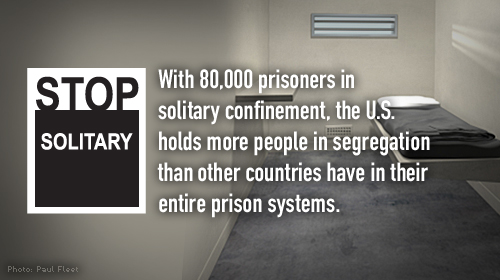The Sad State of Solitary in Florida: Is There Hope for this Human Rights Violation?


The world got a glimpse this week into how the United States treats those we lock in solitary confinement, when the Inter-American Commission on Human Rights heard └Ž░─├┼┐¬Į▒Įß╣¹ testimonies on how our treatment of vulnerable prisoners violates international human rights norms. The short story: we should be ashamed. For a more detailed picture, check back throughout the week for an ongoing blog series on the issue.
The United States has become a global outlier in its over-reliance on incarceration. Our soaring incarceration rates are, by now, a familiar statistic, expressed in any number of shocking formulas: the U.S. has less than 5 percent of the worldŌĆÖs population but over 25 percent of the worldŌĆÖs incarcerated people; the incarceration rate in the U.S. is four times the average for Western European countries; the U.S. incarcerates more people than South America, Central America and the Caribbean combined. In this era of mass incarceration, the racial disparities are staggering: one in four African-American children in the U.S. has grown up with a parent incarcerated.
But none of these statistics quite capture our inhumane treatment of many prisoners, especially those who are the most vulnerable ŌĆō children, the elderly, and those struggling with mental illness.
Prison conditions, particularly conditions of solitary confinement, are often, by definition, hidden from public view. Yesterday, the world peered into our prisons and jails when the Inter-American Commission on Human Rights (IACHR) held a hearing on human rights and solitary confinement in the Americas. The └Ž░─├┼┐¬Į▒Įß╣¹ of Florida and Florida Institutional Legal Services submitted testimony to the IACHR describing the solitary confinement of children and the prisoners with mental disabilities incarcerated in Florida prisons and jails.
Currently, the sad state of affairs in Florida serves as a prime example of the U.S.ŌĆÖs poor human rights record on solitary confinement.
FloridaŌĆÖs state prison population is the third largest in the United States, with a higher incarceration rate than any country in Central or South America. Florida incarcerates 100,272 people in its 60 state prisons and supervises almost 115,000 offenders on community supervision. Florida sends more young people under age 18 to adult state prisons than any other state in the nation.
Prisoners held in solitary confinement in Florida state prisons can be there for months on end. They are detained in nearly complete isolation, entitled to leave their cell three times per week to take a shower, and, only after thirty days, an additional three hours per week to exercise. Children in state prison may be subjected to solitary confinement and endure long periods without exercise, educational instruction, contact with their families or any rehabilitative programs and services.
Although children and mentally ill prisoners are particularly susceptible to the devastating physical and psychological effects of total isolation, they are dramatically overrepresented in solitary confinement. Neither Florida law nor its correctional regulations applies solitary confinement any differently to children or those who are seriously mentally ill, as compared to other prisoners, demonstrating a willful blindness to the particular vulnerability of these populations. In recognition of these practices, international bodies are increasingly investigating the treatment of incarcerated juveniles in the U.S.
The systemic isolation of vulnerable prisoners bucks the emerging consensus that extended solitary confinement violates the international prohibition on cruel and inhumane treatment. By reporting on solitary confinement in the Americas, the IACHR will have an opportunity to shine a light on how the U.S. has deviated from international human rights norms.
ItŌĆÖs clear that Florida is out of step with international law and standards. However, there may be cause for hope. If Florida passes SB 812, which was introduced by State Senator Gibson in February, the state would go from being one of worst violators to the state with strongest protections against harmful solitary confinement for young people in adult jails and prisons.
If a nation's greatness is measured by how it treats its weakest members, Florida must act quickly to remedy the mistreatment of our most vulnerable prisoners. We can begin by passing and implementing SB 812 to protect children in facilities statewide.
Previous posts in the series:
└Ž░─├┼┐¬Į▒Įß╣¹: Solitary Violates Human Rights
Learn more about solitary confinement and other civil liberty issues: Sign up for breaking news alerts, , and .
